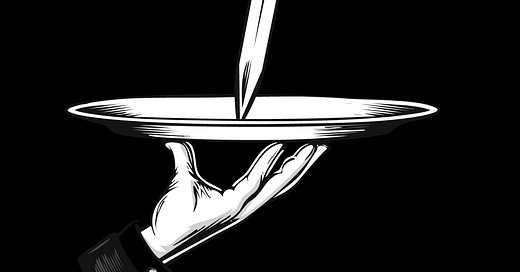Lady with a Lamp by Dorothy Parker
If you need a distraction today but only if it's dark as hell to match your mood
I originally subtitled this piece Dorothy Parker is having a moment (and I couldn’t be happier) but the only thing I’m feeling today is a churning anxiety. To distract myself and hopefully you, here’s a little piece about Dorothy Parker and one of her many superb short stories.
When I was a surly and sarcastic teen, I loved Dorothy Parker. She was an early hero and I aspired to her level of wit, her ability to hold her own with the (mostly) men of the Algonquin Round Table, and what seemed like an impossibly glamorous and sophisticated life (!). I loved her so much, my parents took me to New York to stay at the Algonquin Hotel so I could commune with her spirit (I was kind of an odd kid). I was drawn to her cynicism and world-weariness, the gin-soaked, chain-smoking glamour, like a sheltered suburban moth to a flame.
As I got older, I moved on to more overtly feminist writers and I came to view Parker, with her acid tongue and endless quips, as a clever but ultimately shallow writer. Her poetry is, frankly, the problem. Take, for example, “Two-Volume Novel:”
The sun’s gone dim, and
The moon’s turned black;
For I loved him, and
He didn’t love back.
It’s fun. Pithy, clever, great title that brings the joke home. It’s perfect for today’s meme-able world, and if she’s remembered now, it’s for some other highly quotable remark she made, either in verse, as an aside to one of her writer buddies, or in book and theater reviews she wrote for The New Yorker, Vanity Fair and Esquire. But it’s in her short stories that Parker showed off her skill as a writer. She agonized over every word and it shows. They are polished jewels, with not a single word wasted.
Parker didn’t write any “straight” mysteries and had no relationship with any Golden Age writers that I’m aware of, but so many of her short stories read like horror that I decided that’s close enough. She had a particular gift for soliloquies - short stories written as monologues, with only the endless prattle of the narrator to guide you through the story. Most famous is perhaps “A Telephone Call” but for sheer terror, “Lady with a Lamp” is unmatched: a woman goes to visit her emotionally and physically fragile friend - it is strongly implied she has had an abortion - and psychologically destroys her. It is a completely one-sided conversation - we never hear the bed-ridden woman’s replies to her guest’s faux-concerned questions, but we don’t need to. It’s a remarkable high-wire act that Parker performs without a single wobble.
Oh, I wish you’d get over that Garry McVicker! If you could just meet some nice, sweet, considerate man, and get married to him, and have your only lovely place - and with your taste, Mona! - And maybe have a couple of children. You’re so simply adorable with children. Why Mona Morrison, are you crying? Oh, you’ve got a cold? You’ve got a cold, too? I thought you were crying, there for a second. Don’t you want my handkerchief, lamb? Oh, you have yours. Wouldn’t you have a pink chiffon handkerchief, you nut! Why on earth don’t you use cleansing tissues, just lying there with no one to see you? You little idiot, you! Extravagant little fool!
Chilling. The unnamed visitor goes on, in the guise of friendship, to ‘reluctantly’ confide that the man in question has been seen all over town with a new woman, expertly rubbing salt into the wound until our poor bedbound victim (shades of Misery) has a complete breakdown. It’s a tour de force piece of writing, and the ease with which it reads belies the agony it took Parker to write.
If, by today’s standards, her poems are, as Brendan Gill notes in his introduction to The Portable Dorothy Parker, “tainted with a glib gallantry every bit as false as the revolting cuddly high spirits of Mrs. Parker’s literary mortal enemy, A. A. Milne,” her short stories feel as true, as casually devastating, as they did almost a hundred years ago.
While Parker’s poems and quips embody the Anything Goes ethos of the 1920s and early 1930s, her short stories depict the dark underside of the era: the descent into alcoholism and irrelevance of a good-time girl who stayed at the party too long in 1929’s “Big Blonde,” the casual cruelty of the monied class in “Horsie,” and “From the Diary of a New York Lady.” Abortion appears again in “Mr. Durant,” purportedly inspired by her own abortion. It’s another pitch-black, note-perfect little tale about the perfidy of man, a subject she knew only too well.
Her poems may be eminintly quotable and her criticism is often delightfully bitchy, but her short stories pack a wallop that will leave you bruised for days. I imagine she wouldn’t have wanted it any other way.






